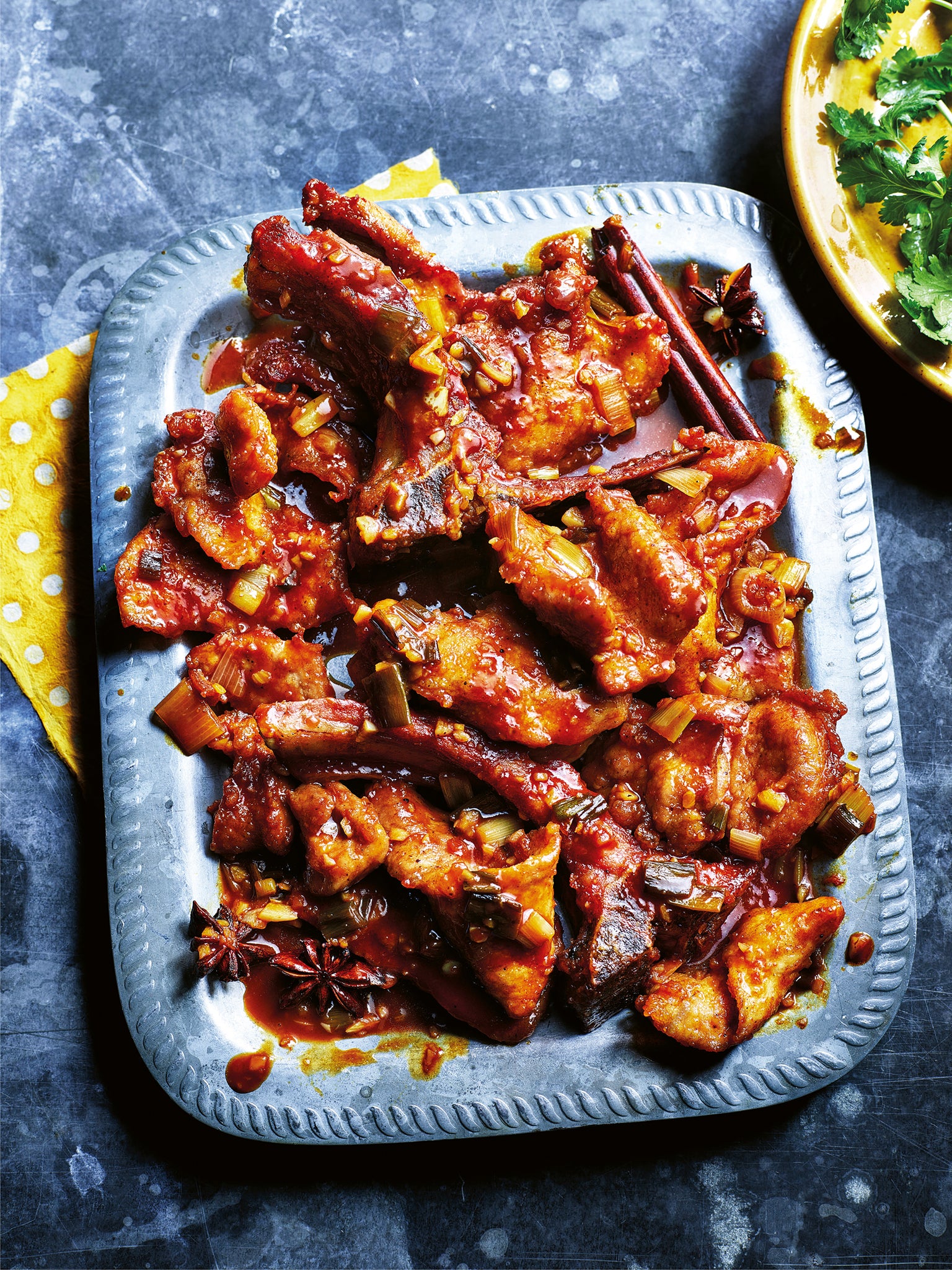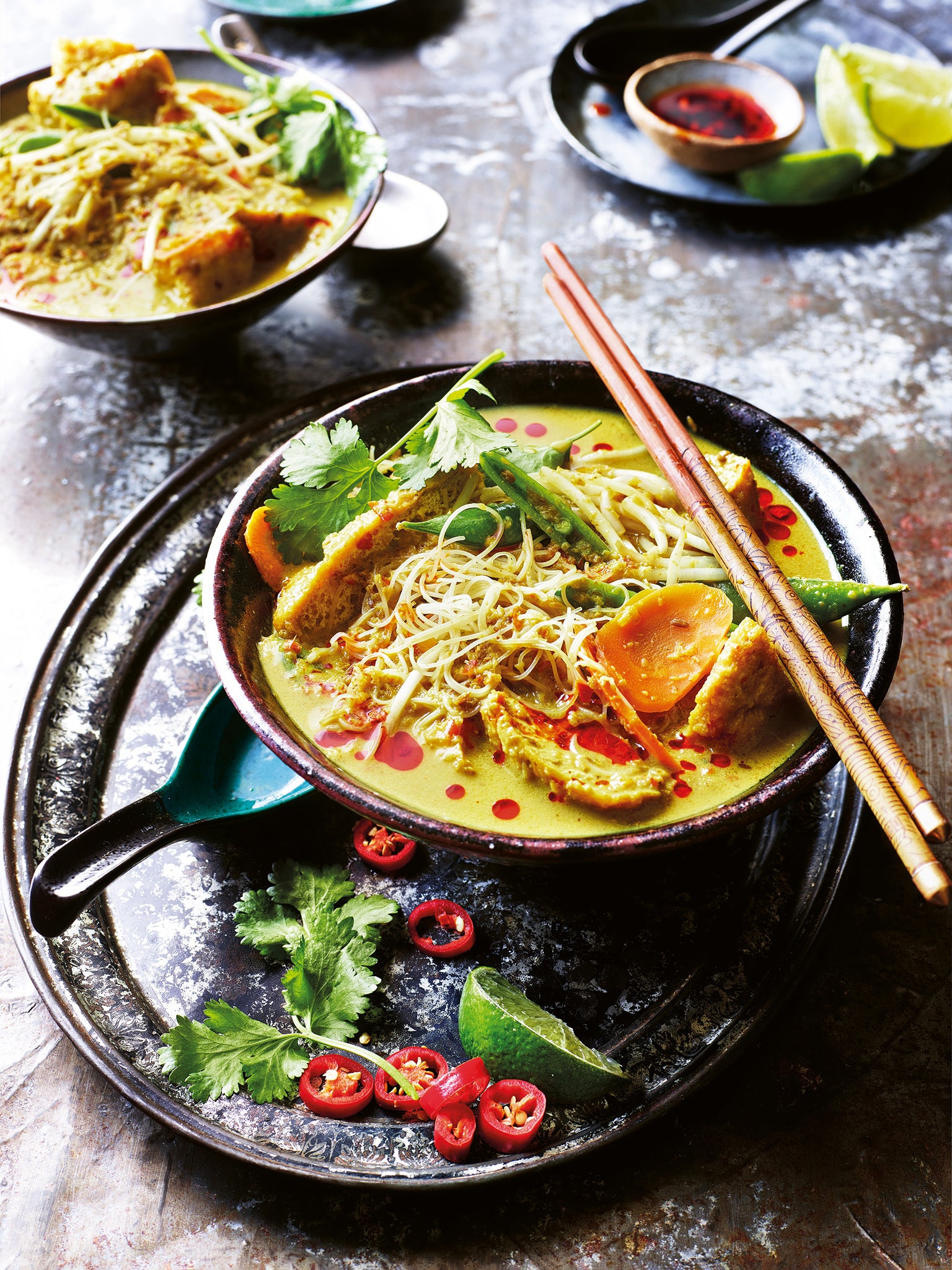
If you’re looking for a quick and easy midweek dinner, Jeremy Pang has you sorted with this flavour-packed prawn recipe.
Salt and Sichuan pepper prawns
Serves: 2
Ingredients:
300g shell-on raw tiger prawns
2 tbsp cornflour
Vegetable oil
6-8 garlic cloves, finely chopped
½ thumb-sized piece of ginger, peeled and finely chopped
1 large red chilli, finely chopped
1-2 spring onions, finely chopped
For the spice mix:
1 tbsp Sichuan peppercorns
1 tsp salt
½ tsp white pepper
Pinch of sugar
Method:
1. Butterfly the prawns by cutting through the shells down the backs, running your knife through the meat to open them out. Stop slicing just before the tail to keep it intact. Scrape out the black digestive cord, then place the butterflied prawns in a mixing bowl and wash well in cold water. Score horizontally across the prawn meat four to five times so that they open up nicely while cooking, then dust them with the cornflour.
2. For the spice mix, toast the Sichuan peppercorns in a dry pan, swirling them around on a medium heat for one to two minutes until they pop and become fragrant. Add the salt to the pan, then transfer to a pestle and mortar or spice grinder, add the white pepper and sugar and pound or grind to a powder.
3. Heat two to three tablespoons of oil in a frying pan and bring to a high heat. Place the prawns meat-side down in the pan and fry for three to four minutes, until they start to turn pink. Turn and cook the prawns until pink all over, then remove from the pan.
4. Build your ‘wok clock’ (i.e. arrange your prepared ingredients on a plate before you cook, in the order you need them): Start at 12 o’clock with the garlic, then the ginger, red chilli and spring onions, the spice mix and lastly the fried prawns.
5. Heat one to two tablespoons of oil in your wok over a medium heat. Add the garlic, moving it constantly until it starts to brown and separates a little – about 30 seconds. Then add the ginger, chilli and spring onions. Throw in the spice mix and immediately add the cooked prawns to the wok. Toss through five to six times in the wok to fully coat the prawns before serving.
Peking mandarin pork

“Deep-fried meats don’t have to just be crispy,” says Pang.
“In this dish, the sparing use of cornflour creates a crisped edge around each piece of pork, at the same time allowing it to soak up plenty of the moreish sweet and sour sauce.”
Serves: 2
Ingredients:
2 pork chops or shoulder steaks
½ thumb-sized piece of ginger, peeled and roughly chopped
2 garlic cloves, roughly chopped
1 spring onion, cut into 2cm chunks
3 star anise
1 small cinnamon stick
Vegetable oil
Handful of coriander leaves, to garnish
For the marinade:
½ tsp salt
½ tsp Chinese five spice
¼ tsp sugar
1 tbsp Shaoxing rice wine (or dry sherry)
1 tsp sesame oil
4 tbsp cornflour
For the sauce:
½ tbsp orange marmalade
100ml fresh orange juice
1 tbsp rice vinegar
1 tbsp plum sauce (or ketchup)
1 tbsp light soy sauce
1 tsp dark soy sauce
100ml chicken stock
Method:
1. Carefully, using the back of your knife or cleaver, bash the pork chops or steaks to tenderize the meat, then cut into three to four centimetre pieces and place in a mixing bowl. Massage the marinade ingredients into the pork, taking care to add in the cornflour at the very end and mix well.
2. Mix the sauce ingredients together in a small bowl.
3. Build your ‘wok clock’ (i.e. arrange your prepared ingredients on a plate before you cook, in the order you need them): Start at 12 o’clock with the marinated pork, followed by the ginger, garlic and spring onion, star anise and cinnamon stick, and lastly the sauce bowl.
4. Deep-fry the pork in vegetable oil in two batches at 180°C for four to five minutes until golden brown. Transfer the pork to a plate lined with kitchen paper.
5. If you used your wok for deep-frying, carefully pour out the oil into a heatproof bowl to cool and give your wok a quick wipe with kitchen paper. Place the wok back on the hob and bring half a tablespoon of vegetable oil to a high heat until smoking hot.
6. Add the ginger, garlic and spring onion to the wok and stir-fry for 30–60 seconds before adding the star anise and cinnamon stick. Next add the sauce to the wok and bring to a vigorous boil. Once bubbling rapidly, add the fried pieces of pork into the sauce and vigorously boil for a further one to two minutes. Garnish with coriander and serve.
Vegan laksa

“For me, a laksa is the perfect quick-win vehicle to use up any leftover curry, as you can easily use it in place of the homemade curry paste,” says Pang.
“Though it won’t hold a candle to the laksa aunties of Malaysia, it will make an easy, tasty dinner, so feel free to give it a try with this recipe.”
If you do make the curry paste, you can freeze any left over for another day.
Serves: 2
Ingredients:
4-5 lime leaves
400ml can of coconut milk
100g deep-fried tofu pieces, halved diagonally
200g rice vermicelli
Handful of sugar snap peas
1 carrot, finely sliced
100g beansprouts, rinsed
Vegetable oil
For the curry paste:
8-10 dried red chillies
2 tsp cumin seeds
2 tsp coriander seeds
1 tsp ground turmeric
½ red onion, finely chopped
½ thumb-sized piece of ginger, peeled and finely chopped
3 garlic cloves, finely chopped
2 lemon grass stalks, trimmed, bruised and finely chopped
For the stock:
500ml coconut water
500ml vegetable stock
1 tbsp palm sugar (or soft brown sugar)
4 tbsp light soy sauce
½ tsp sea salt flakes
To garnish:
Lime wedges
Handful of coriander
Sliced red chilli
1 tbsp sambal, ready-made or homemade (optional)
Method:

1. If making the curry paste, soak the dried red chillies in hot water for 10 minutes, drain and finely chop. Pound all the curry paste ingredients using a pestle and mortar until smooth. Stir the stock ingredients together in a jug.
2. Build your ‘wok clock’ (i.e. arrange your prepared ingredients on a plate before you cook, in the order you need them): Start at 12 o’clock with the curry paste or leftover curry, followed by the lime leaves, coconut milk, the stock, tofu, rice vermicelli, sugar snaps, carrot and lastly the beansprouts.
3. Heat two tablespoons of oil in your wok to a medium heat. Add three to four tablespoons of curry paste (or five to six tablespoons of leftover curry) and stir-fry for four to five minutes until it deepens in colour. Now add the lime leaves and one-quarter of the coconut milk and bring to a vigorous boil. Stir well, scraping off any paste stuck to the bottom of the wok and then add a further quarter of the coconut milk. Return to a boil before adding the remaining coconut milk to the wok. Pour in the stock and return to a boil once again. Next add the tofu pieces, reduce the heat to medium and simmer for 15–20 minutes until the flavour deepens and the stock reduces.
4. To finish the soup, add the vermicelli and boil for three to four minutes before fishing it out with tongs or a slotted spoon and dividing between serving bowls. Add the sugar snaps and carrot to the soup and boil for two to three minutes. Scoop the veg out of the soup and place on top of the noodles. Next, dunk the beansprouts into the hot soup for 30 seconds. Scoop out the tofu into the serving bowls, followed by the just-cooked beansprouts on top. Pour the broth over the bowls of noodles and veg and scatter the garnishes over the top.
‘Jeremy Pang’s School Of Wok: Delicious Asian food In Minutes’ (published by Hamlyn, £20; photography by Kris Kirkham), available now.







